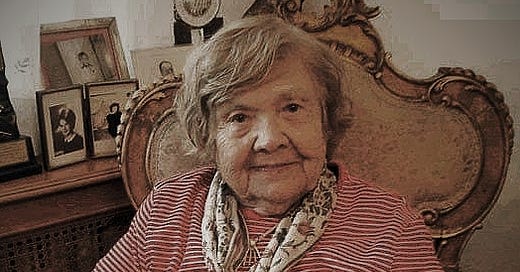Today is my birthday. How strange it feels to write that sentence, to commit it to here with any expectation that it holds weight. Birthdays are banal things in their essence: a date imbued with importance simply because it serves as a waypoint, a marker of time's relentless march. Ordinarily, they are adorned with candles, bright and flickering; gifts wrapped in soft paper; and that shallow, fleeting joy of being briefly the axis upon which one's circle of companions spins. Yet today, all these trivial adornments feel out of place, crude even.
Why? Because as my story enters its twenty-first year, another—a far grander narrative—has reached its terminus. Muazzez İlmiye Çığ, in my native language, Muazzez Hanım of my youth, my guiding star in the skies of scholarship, has passed into eternity. On the day of my beginning, I mourn her end.
And yet, I hesitate to call it an end, for there is something in her passing that defies the finality of that word. Death, cruel as it is, lacks the power to erase figures such as her. How could it? She was not merely a woman but an epoch, a force of intellect and passion too vast to be contained within a single lifetime.
For those unacquainted with her, allow me the privilege of introduction. Muazzez İlmiye Çığ was a Turkish scholar, a Sumerologist of rare brilliance, who dedicated her existence to the study of the ancient world. She unearthed voices long silenced, deciphering the cryptic marks etched into the clay tablets of Sumer, Akkad, and Babylon. These tablets, mere inches of baked mud, bore the weight of civilization’s infancy, the earliest records of law, religion, and poetry.
Born in 1914, Muazzez Hanım's life spanned empires. She came into the world under the waning crescent of the Ottoman Empire and lived to see the modern Republic of Turkiye blossom. Hers was a century that birthed revolutions in thought, technology, and society. Yet, while others were enraptured by the forward march of progress, she turned her gaze backward, to the cradle of human history.
And how she made it sing! She did not merely translate those brittle tablets; she brought them to life, revealing their wisdom and folly, their tenderness and violence. In her hands, history was no longer a dry recitation of dates and events; it was a living, breathing thing, brimming with the blood and breath of those who came before us.
It is a strange thing to claim kinship with someone you have never met, yet I feel no hesitation in saying that Muazzez Hanım shaped me. Her work was the cornerstone of my intellectual awakening, one of three pillars upon which my understanding of the world was built. She taught me that history is not a mausoleum but a library, its shelves overflowing with lessons and warnings, treasures and tragedies.
Her courage, too, was instructive. She lived in a world that often dismissed women’s voices, especially in realms as obscure and labyrinthine as Sumerology. Yet she persisted, unyielding, armed with an intellect that could not be ignored and a determination that would not be silenced. She was, in every sense, a torchbearer, lighting the way for others to follow.
And now, the torch has passed to us, to those who remain.
How cruel, then, that her passing coincides with my birthday, a day meant to celebrate life. But perhaps there is a symmetry to it, a poetry that I am not yet wise enough to grasp. After all, she devoted her life to beginnings—the origins of writing, law, civilization itself. Is it not fitting, then, that her death should serve as a beginning for those she inspired?
I sit here, writing these words, my thoughts a tangle of grief and gratitude. She is gone, yes, but her legacy is indelible. The tablets she touched, the books she wrote, the ideas she ignited—these endure. Through them, she achieves a kind of immortality, one that death cannot tarnish.
Today, I make a vow. I will honor her memory not with idle words but with action. I will learn, teach, and create, carrying forward the light she so generously shared. If I can be even a shadow of her brilliance, I will consider my life well-lived.
This, then, is how I celebrate my birthday: not with cake or laughter, but with a quiet resolve. I celebrate the privilege of having lived in her time, of having been shaped by her wisdom. I celebrate her—a woman whose life was a mirror in which humanity could glimpse its noblest potential.
May Muazzez Hanım rest in peace. Or better yet, may she continue to speak, through her work, to generations yet unborn. For though she has left this world, her voice will echo in its corridors for as long as we have ears to hear.




NOO Im just now reading this!!!! Happy late birthday to one of my favorites on Substack!!!
Those who are left behind will miss her. Yet, her work and her words are immortal - they become a lighthouse to us all , guiding us safely into our future.
Still , enjoy your birthday, I have faith in you.